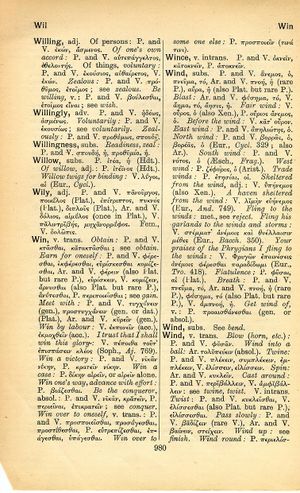wily: Difference between revisions
From LSJ
τὸ κακὸν δοκεῖν ποτ' ἐσθλὸν τῷδ' ἔμμεν' ὅτῳ φρένας θεὸς ἄγει πρὸς ἄταν → evil appears as good to him whose mind the god is leading to destruction (Sophocles, Antigone 622f.)
(Woodhouse 5) |
(CSV5) |
||
| Line 1: | Line 1: | ||
{{ | {{Woodhouse1 | ||
| | |Text=[[File:woodhouse_980.jpg|thumb|link={{filepath:woodhouse_980.jpg}}]]'''adj.''' | ||
P. and V. [[πανοῦργος]], [[ποικίλος]] (Plat.), [[ἐπίτριπτος]], [[πυκνός]] (Plat.), διπλοῦς (Plat.), Ar. and V. [[δόλιος]], [[αἱμύλος]] (once in Plat.), V. [[παλιντριβής]], [[μηχανορράφος]]. Fem., V. [[δολῶπις]]. | |||
}} | }} | ||
Revision as of 10:09, 21 July 2017
English > Greek (Woodhouse)
adj.
P. and V. πανοῦργος, ποικίλος (Plat.), ἐπίτριπτος, πυκνός (Plat.), διπλοῦς (Plat.), Ar. and V. δόλιος, αἱμύλος (once in Plat.), V. παλιντριβής, μηχανορράφος. Fem., V. δολῶπις.

